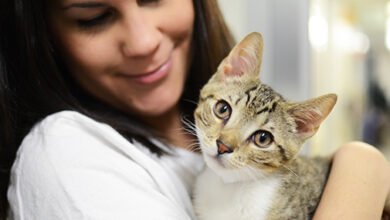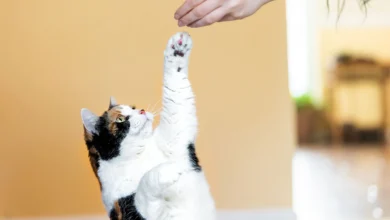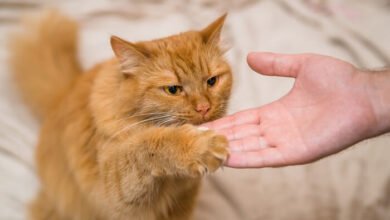Cat Behavior
More Oddities In my previous article on cat behavior, we discussed some interesting and unusual behavior displayed by the family of cats that live on my farm.
That was only the beginning. These cats seem to delight in unexpected behavior. I thought I would share a few more gems with you.

There are three female cats on my farm. They consist of matriarch, Patch, and two of her daughters.
There have been other female cats on the farm, but I have been able to find new homes for all of them. Cats, being solitary hunters, are not expected to show any kind of social hierarchy.
My three female cats do have a definite hierarchy. The top cat is, of course, Patch. It’s the two daughters that have been interesting.
The older daughter, Calico, is from Patch’s first litter she had on the farm. She is a sturdy, healthy calico that has not had any real problems.
The second daughter is Little Girl. Little girl is a couple of years younger than Calico. She is the smallest cat on the farm. A black cat with flashy white markings, little girl is active and elegant.
Since her birth, Calico has been Patch’s favorite daughter. Calico and patch hung out together much of the time.
Patch even allowed Calico to help her with her kittens. When Patch wanted to go do something, Calico was right there to baby sit.
Even when Patch was there, Calico was often right there with her. She could often be seen washing a kitten or even just providing a nice warm place for the little guy to sleep.
When Little Girl arrived things continued quite awhile in the same way. Little Girl grew up and had her first litter of kittens.
Calico, as occasionally happens with calico cats has turned out to be sterile.
She has never had any kittens. Because of that, when little Girl had her kittens, Calico lost her favorite daughter status.
With Little Girl’s kittens, Patch became the doting grandmother.

She was always helping Little Girl with her kittens. The two of then could often be see lying together, bathing the kittens or watching them play.
Calico was banished. She wasn’t allowed anywhere near those kittens or any other litter since.
Calico didn’t just lose kitten privileges. She wasn’t even allowed to hang out with Patch anymore the way she used to.
Poor Calico, she was very upset. She knew exactly who to blame for her predicament. Little Girl. Calico and Little Girl fought several times. Unfortunately for Calico, Patch would sometimes jump in on Little Girl’s side and run her off.
Calico was banished to hanging out with her brothers. It’s been a couple of years since then. Little Girl is still favorite daughter.
Calico’s position has eased somewhat. Last summer, Little Girl allowed Calico to help her with her kittens once in awhile. Patch has allowed Calico to hang out with her again from time to time.
Who knows?
One day Calico may just be able to work herself back into her mother’s good graces. Little Girl seems to think so.
She watches Calico very carefully. If she thinks things are going too well for Calico, Little Girl will start a fight with her. Oh well, Life goes on.
It isn’t only the girls showing some interesting behavior. This past year two brown kittens were born.
Thomas, a handsome cinnamon brown with lots of flashy white, was born in the spring.
Pudge is solid brown without any white at all and was late summer. What is interesting about these two is that they are both fascinated by horses.

We have three horses and every day you can find Thomas or Pudge (or both) strategically
positioned to watch them.
When I call the horses out of their pasture, often I find Thomas trotting in along with them. If I throw hay into their mangers I have to check before I throw.
Quite often Thomas or Pudge will be sitting in the manger, ready for a close up study of the horse.
When the horses are grazing, Thomas will creep along, nose to the ground until he’s almost nose to nose with the horse.
He will stay there for a few moments until the horse gently swings his nose at the kitten to push him out of the way.Pudge has recently developed a fascination with horse’s tails.
He will come right in behind the horse’s heels and start playing with the tail. Fortunately for him, the horses have refrained from launching him into orbit.
Cats are funny and entertaining creatures aren’t they. You just never seem to know what they are going to do next.
Analysis of Cat Behavior
The most important thing to remember in analyzing the behavior of your cat is that your pet is not a human. Cats are not rational beings and their actions are not based on emotion.
Changes in his behavior are not stemmed from any repressed anger with you; your cat is not trying to get revenge on you for being away from home too much or bringing a new baby into the house.
Negative changes in cat behavior are typically cause by stress or anxiety for the cat. It is easy to see why pet owners tend to conclude that the cat‘s feelings toward them are causing the behavioral differences; it is human nature to correlate two unrelated events.
In reality, there is a missing link: your behavior may cause the cat physical anxiety, thus the cat‘s behavior alteration is based on physiological changes in his body.
One common complaint among cat owners is that their cat has suddenly chosen a new favorite place to deposit wastes instead of his litter box. This could be a result of a few factors. First, it may be a medical problem.
Cats are prone to urinary track infections that make it extremely painful to urinate. Cats then associate the pain of urination with the litter box, so they do not like to visit their designated urination station.
If your cat has stopped using the litter box, your first step should be to take him to the vet and have a thorough check-up run on him.
Cats also have natural preferences for certain textures and smells, so if you have recently changed the type of cat litter you use, the cat may be showing that he does not care for the new feeling or smell of his litter.
In avoiding the litter box, the cat may have become attached to new textures and locations around your household, perhaps the soft living room rug or bedroom closet.
The best strategy is not to punish the cat; he will not understand. Rather, have a medical check up, switch litters, and continuously reintroduce the cat to his litter box. Reward him for using it, just like he was a kitten again.
To relieve any anxiety your cat may be feeling, carefully analyze any changes that have occurred in his life as of late. If a new baby or roommate comes into the house, your cat may feel threatened, so be sure to give him extra attention.
If you suddenly have to spend more time away from home than normal, consider getting a second cat so that your cat does not spend his days alone. Although the cat is not having emotional reactions, his body feels different due to changes around him.
Be in tune with what may be causing your cat to feel anxious, analyze the situation, and do the loyal owner duty of relieving his stress.
Common Meanings Of Cat Behavior
A lot of people think that cats work on their own agenda, not paying much attention to their owner – provided they have clean litter, food, and water.
Cats can behave in odd manners at times, which can easily confuse their owners and make it really hard to determine what the cat wants.
As much as cat behavior can be confusing, there are some ways that you can solve common cat behavior mysteries.
A common behavior that almost all cats do is push their heads into any type of object that will allow them to do it. You’ve probably seen your cat do this before, probably against table legs, TV stands, or another object.
This can be noticed more when you have other people who own animals or those with allergies over at your house.
When a cat notices this, he will rub his head against the person. In doing so, he will put a touch of saliva on the individual. In a cat’s mind, he owns what he puts his saliva on.
By putting his saliva on something, that object or person will have a familiar scent. Although this can be very annoying, you have to understand that other people in your home are seen as odd or weird to your cat.
When a cat does this, he is simply trying to make the visitor belong. When he brushes up against them and puts his saliva on them, he is trying to put his scent on them – which in his mind will mean that they belong in his territory.
Even though marking someone or something with saliva is beneficial to the cat, saliva is one of the most common forms of pet allergies.
When someone wipes the saliva off of them, the scent will be gone and the cat will go back and attempt to do it again.
Even though it may appear that cats target those with allergies, cats are actually just trying to make the visitor belong at the house.
If the guest simply cannot take the saliva, allow the cat to rub himself on their pants leg a few times. Normally, this is all takes for a cat to leave the person alone.
Those of you who an indoor cat should expect the cat to spend quite a bit of time lying near windows. During this time, you may hear your cat make very strange noises or weird movements.
You shouldn’t fear though, as he is simply acting out his hunting instincts. Whether it’s another cat or object outside moving about, the cat will see it and simply go into his native hunting instinct.
As most already know, cats love to play. They love to played with, especially with toys. They will pounce on things on occasion, which should always be expected.
If you try to prevent this type of behavior, your cat will take a very negative approach and you’ll end up with a lot of broken things in your home. You can always play with your cat using a string, as he will love to chase the string around the room.
The longer you own your cat, the more odd behavior you’ll see him exhibit. Cats behave in strange ways, although they always have a reason for behaving the way they do.
If you can understand why your cat behaves like he does, you’ll have no problems keeping him healthy and happy. If you simply pay attention to your cat and the way he behaves at times – you’ll be able to understand him better than ever before.
How To Stop Your Cat Spraying
The cat backs up to the door, lifts the tail and releases a fine spray of urine. Yes, your cat is spraying. You have a problem. But one you can solve.
Figures from the British Association of Pet Behaviour Counsellors say that aggression in dogs and marking behavior in cats are the biggest behavior problems in the UK pet population.
Spraying is marking behavior, not a litter box problem. Sprayed cat urine contains pheromones, a substance that animals use to communicate. Combinations of pheromones work like fingerprints: they identify the cat.
A spraying cat marks his or her territory with cat urine. It simply says: ‘This is mine’. You may not like it, but getting angry doesn’t help. It may even have an opposite effect: more spraying.
Cats in heat are attracted by the odor of cat urine. For them, spraying is something like an invitation to love. The results may be there in 65 days: a nest of cute little kittens.
Cats do not only spray during sexual encounters. Some also do it during conflicts with other felines, or when they are stressed.
For people the scent is far from pleasant. Thankfully most cats spray outside. But what if you have a cat spraying inside? Do something about it! And yes, that is possible.
The most radical and effective thing you can do is neutering or spaying your cat. Most castrated toms stopped spraying from the day they were operated.
But maybe you have a reason not to neuter your cat. In that case try to find out why your cat sprays.
Maybe it sprays only when it sees another cat.
Solution: block the view. Or it sprays because of a conflict with another pet. Keep them separated and problems might be over.
If you don’t know why your cat sprays, discuss it with your veterinarian. Chances are he will advice you to spay or neuter. But your vet can also check if there is a medical problem.
Anyway, do not leave this problem unsolved. Cat urine odor and stains can make your home a very uncomfortable place, and your cat will still remain a cat even when it doesn’t spray anymore.
Why Does My Cat Bite My Hand When I Stroke Her?
You have settled into your favorite armchair, perhaps reading the final chapters of a gripping novel. Suddenly you are aware of the imploring stare of your cat sitting at your feet.

You invite her onto your lap. Gently you begin to stroke her and your cat signals her appreciation with an audible purr.
One hand holding your book the other hand continuing to pet your mouser, you again get lost in your novel. All is well in the world with you and with your cat.
Suddenly your cat bites your hand!
Why did kitty do that? Why did she bite the hand that strokes her?
The experts don’t agree on exactly why it is that some cats enjoy being petted, but end up biting. One thing that they do agree on is that when kitty bites at you, it’s a sure sign that she has decided that she’s had enough stroking.
Cats differ in the amount of petting they will accept, and not all cats respond by biting when they have had enough.
Some cats simply jump from your lap and saunter off to investigate interests anew. But many cats will nip you and your animal is one of them.
Could you have known that a bite was on its way? Yes, there are often signs that cats give before biting. And, if you had not been so wrapped up in reading your novel, you may have paid heed to your little pets warning.
If kitty’s tail begins to twitch, in a rolling flick, watch out! She’s getting ready to chomp at your hand.
If your cats ears start turning towards the back of her head, or flatten against her head, that’s a warning a bite is coming.
If your cat suddenly becomes restless, or stiffens and stares at your hand, she could be about to nip you.
If you noticed any of these signals, simply stop stroking your cat. Your pet will either stay on your lap or jump down and walk off, whichever happens you don’t get bitten.
What you should not do is punish your cat for biting your hand. That simply does not work. Cats are more likely to identify the punishment with you rather than with their bad cat behavior.
If you miss a warning sign and kitty manages to get her jaws around your hand, try to resist the temptation to pull your hand away or push your cat away. Simply freeze.
Chances are that your cat will not sink her teeth in, she has got her message across, and you have stopped petting her.
If you try and push your cat away it is likely that she will fight with your hand resulting in skin punctures for you.
(An animal bite can become infected quite easily, if your cat does draw blood clean up the wound scrupulously and seek the advice of your doctor.)
Why do some cats behave in this aggressive way? The degree of tolerance to petting may be genetic, or it may be learned behavior.
If when your cat was a kitten you allowed her to chew on your hand in play, she learned that biting human hands was an OK thing to do.
So, when she feels that she has had enough stroking (she’s the boss remember,) she will bite at your hand to let you know – if you ignore her warning signals.
Some experts recommend the use of healthy tidbits, as a reward, in order to increase the time your cat will tolerate stroking.
At the first warning signal offer kitty a treat, continue to stroke your cat gently for a time and offer her another reward.
It is said that your cat will learn to connect petting with the tidbits and may, with patience, allow you to pet her for longer periods.
cat behavior pdf,cat behavior by age,cat communication,body language of cats,article about cats,information about cats for kid,pet care,kitten,






